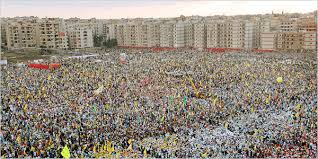记忆方法
throng...........死 拥(因为字母r看上去很像字母y,所以这里把它当作字母y来拼)(很拥挤).............人群;拥塞
中文词源
throng 人群,群集,拥挤
来自中英语 thrang,人群,来自 Proto-Germanic*thrangwa,人群,来自 PIE*trenk,挤,压,催促, 可能来自 PIE*tere,弯,转,扭曲,词源同 turn,throw,torque.比喻用法,即拧在一起。
英语词源
- throng
-
throng: [13] The etymological notion underlying throng is of ‘pressing together’. It was borrowed from Old Norse throng ‘crowd’, which went back ultimately to the prehistoric Germanic base *thringg- ‘press’ (source also of German drang ‘crowd, pressure’ and dringen ‘press’). Amongst its non-Germanic relatives is Old Persian thraxta- ‘closely-packed’.
- throng (n.)
- c. 1300, probably shortened from Old English geþrang "crowd, tumult" (related to verb þringan "to push, crowd, press"), from Proto-Germanic *thrangan (cognates: Old Norse þröng, Dutch drang, German Drang "crowd, throng").
- throng (v.)
- "go in a crowd," 1530s, from throng (n.). Earlier it meant "to press, crush" (c. 1400). Related: Thronged; thronging.
权威例句
- 1. They throng the beaches between late June and early August.
- 6月底到8月初,他们群聚在海滩上。
- 2. An official pushed through the throng.
- 一名官员费力地挤过人群。
- 3. We pushed our way through the throng.
- 我们挤过人群。
- 4. A great throng packed out the theater and overflowed into the corridors.
- 一大群人坐满剧院并且还有人涌到了走廊上.
- 5. The jubilant throng is like the waves of the sea.
- 欢腾的人群宛如大海的波涛.

